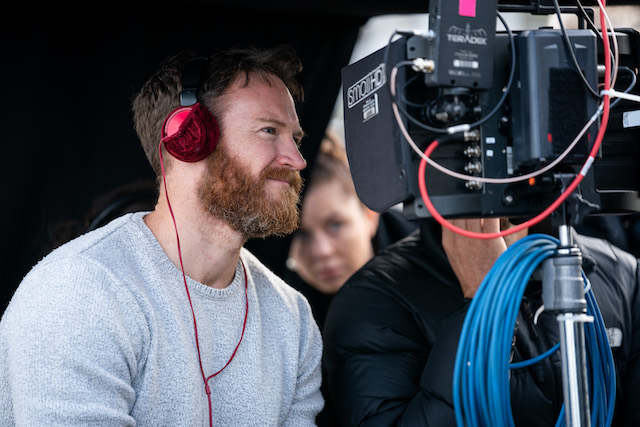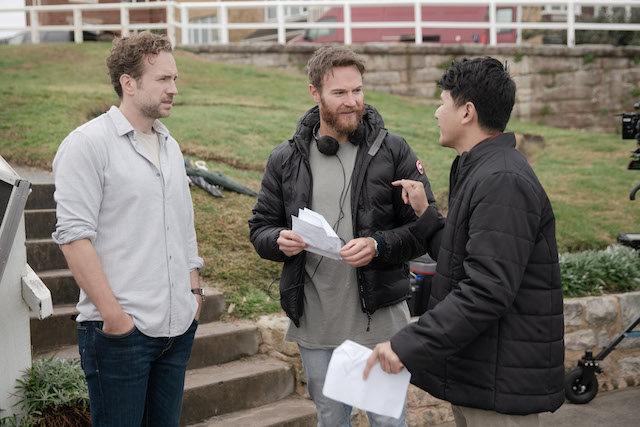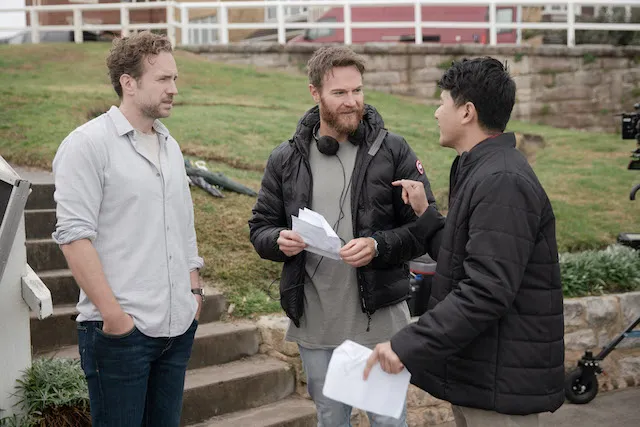
Long Story Short is now available in theaters, digitally on demand and to buy. The second feature film directed by actor Josh Lawson (Mortal Kombat), who also wrote its story, it stars Rafe Spall (The Big Short), Zahra Newman (Truth), Ronny Chieng (Crazy Rich Asians), Dena Kaplan, and Noni Hazlehurst.
“Serial procrastinator Teddy (Rafe Spall) wakes up the morning after his wedding to discover that every few minutes he’s jumping forward to the next year of his life,” reads the synopsis. “Watching his future flash before his eyes, Teddy must make every second count if he is to win back the woman he loves in this feel-good comedy about second chances.”
RELATED: Exclusive Long Story Short Clip – Rafe Spall Stars in Feel-Good Comedy
ComingSoon Editor-in-Chief Tyler Treese spoke with director Josh Lawson about Long Story Short, how he came up with the idea, and how it puts a unique spin on the romantic comedy.
Tyler Treese: Josh, it’s a pleasure to speak with you. I watched the film earlier today and it was incredible. Great job.
Josh Lawson: Oh, thanks, man. I really appreciate that. Thank you.
This is your second feature film that you’ve directed. What lessons did you learn from your first experience that you were able to implement here and improve upon?
Well, so many, but the one that springs to mind first is that I think I got a lot better this time at not fighting every single battle or at least knowing which battles were worth fighting. I think on The Little Death, I’d never directed a feature before and I really wouldn’t let go of anything. I felt like I couldn’t compromise on anything. And it ultimately made the experience pretty painful because making a film is all about compromise. It’s all about sacrificing things because you just don’t have nearly as much as you want. And so if you don’t let go of this stuff, it becomes just crushing. And so this time I think I was like I’m never going to get everything I want and it’s going to be hard, but it doesn’t have to be painful. So I think I had a bit more fun just generally with this one.
When I sat down to watch this, I wasn’t really sure what to expect and it’s quite the ride and there’s a lot of funny moments, but it gets quite emotional and I wound up crying by the end because of the different, very relatable themes. Was it a goal of yours to really bring out emotions in the viewer?
Yeah. I don’t know if it was ever a conscious goal to make people cry, per se. I mean, I can tell you, I cried writing and I would cry watching it back or there were times on set I cried. But I cry at everything so I didn’t really think that it would make people cry. I hoped that audiences would be moved, but I’ll cry at TV commercials and stuff. Like I’m a soft touch. It felt real. And like the stakes are real and, and to deal with the inevitable part of life — death — and that’s why it sort of why the film is bookended at the cemetery because that’s ultimately where we’re all going.
There’s no fighting it. That is the finish line. So the movie is sort of asking you, “What are you going to do before you get here?” And because this is it. I don’t want to make you morbid and you don’t have to think about this every day, but you should know that there is an expiry date on this thing called life. So, you know, chop chop, because the clock is ticking. So yeah, the stakes are high. And I think the reason, if it’s emotional at all, is because it feels truthful. It’s really because it came from a very real place in my life where I was really struggling, looking at my own life going, “Oh my God, I don’t think I’m doing the best I can with this life. I feel like I’m wasting it.”
I now look back on some of the things I’ve done and I wish I’d done more and I’m not in love and I don’t have a family and I’m getting older. And look at all these gray hairs in my beard now and holy shit. And all those fears were bubbling inside me as I was tapping away at the laptop. So I’m glad I connected with you because I think there may not be any more common human thing than the fear of getting older and ultimately dying. The fear of dying might be the most common shared fear of humanity. And so hopefully it connects with people in the same way it did with you.
Yeah. And one of the common themes and the struggles that we see in the film is juggling a career and also dealing with your personal life with your family. He has a strained relationship with his wife because he feels he has to focus on his job. He has to be a provider. And ultimately, that winds up harming the things that he actually values the most. Can you speak to a little bit about that focus and how you connected with that personally?
Well, I’m very much a workaholic. That’s the thing that I wrestle with all the time. I focus very much on work and not as much on the things that, let’s face it, are probably much more important: friendships, family, and all that sort of stuff. So that was really me chastising myself going “God, come on, stop it. Yes, work is important. It’s wonderful to have purpose. And it’s lovely to create things that are yours, but that shouldn’t be the only thing in life.” That should be on one end of the Seesaw. And on the other end should be all this other stuff that I haven’t focused on. But right now it’s just like an elephant on one end of the seesaw and sort of a mouse on the other, and it just feels very unbalanced. But I also think at this point in age in the Western world, we focus very much on work and on the success of work and money. Never before have we focused so much on the importance of wealth and how do we get wealth from work? There’s this idea that you are not worth as much as a person if you don’t have enough money in your bank account.
We’ve been talking to China and Korea about their versions of this. They’re interested in doing their own versions and both of those cultures have responded a lot to the workaholism part of the film. They’re like, “In our culture, we focus very much on work and that’s what connected with us is this idea that we’ve become obsessed with work.” And so it may not just be the Western world. It sounds like it might be just a human thing that we’re on the hamster wheel. And it’s never enough. That’s the other thing in the film. You get these promotions and it’s like, “Oh yeah, but if I get the next promotion, then I will honestly take my foot off the accelerator” but then he gets it and then it’s like, “Oh no, then there’s another promotion. You don’t understand. I’m so close to making partner.” That’s the trap. The carrot gets dangled in front of you forever. And then you look down and you’ve got the golden handcuffs on. For sure it came from a real place. It was just about me trying to unshackle myself from the obsession with work and focus on more permanent joys in life.
The film has such a unique mechanic of time moving forward every few minutes exactly a year. And I love that it’s on his anniversary so he just looks like the biggest deadbeat forgetting his anniversary each year. And it’s really unique implementation because we have some Groundhog Day elements, which gets mentioned in the film, but it’s still its own thing. How’d you come up with that idea?
Initially, I had the idea that he wakes up like Groundhog Day, and each time he wakes up, it was a new year. I was struggling with that because I thought it was lagging. There’s all this time, you know, to get through the day to get through the next day, I was like, “It needs to be faster.” This whole thing is about life slipping away. It should go by in a blink of an eye. And so when I had the idea of just going, “It shouldn’t be waking up. It should be every few minutes.” He should sort of think he’s getting a hold of it, but by the time he’s walked through the next door, it’s the next year, and he’s like, “Oh, no, not again.”
So there is this sort of mania that Teddy goes through because it’s never-ending. And so for that 60 minutes, essentially after he wakes up for the very first time, and then he goes through year after year after year, we don’t leave him. We’re with him for those 60 minutes. We experience his curse in real-time, essentially, as he gets through the years of his life. But there’s a moment in the film where he says, “I haven’t peed for like eight years.” He hasn’t even been to the fucking bathroom. He woke up and it’s now eight years later. That’s how quick it all is.

I loved the snappy pacing to it. The film’s pretty concise. It’s like 95 minutes long. And there’s never a scene where it drags. What really went into editing and making sure that every scene had a purpose and was impactful?
I’m pretty brutal in the edit suite, to be honest. I’m a big fan of a concise film. I desperately don’t want to make a film where you can walk away and go, “Well, that was good, but it could’ve lost 10 minutes.” I don’t want to waste anyone’s time. That really is it. I know that’s sort of part of what the film is about, but it’s true. I really don’t want to waste anyone’s time. I know that time is precious to people and I don’t want to waste it. So if you make the commitment to sit down and watch any one of my films, and in this case, Long Story Short, I promise you, I won’t waste your time right.
Now, love it or hate it — and I hope you love it — but I don’t think you can walk away going, “Oh, well, that was boring.” I hope it’s not boring. I think it moves too quickly to be accused of being boring. We also live in the Netflix world where if you don’t get the audience’s attention in the first five to 10 minutes, you’ve probably lost them and they’ve moved onto the next thing in their queue. So you’ve got to be a little smarter about how quickly you engage an audience now and how you keep their attention. Unfortunately, the audiences are like goldfish now, because we are just so inundated with content. So if you don’t have something major happen every five minutes, you might lose them.
So you’ve got to be really diligent about where you put those plot points and how fast they come. That’s one of the reasons why he keeps jumping every few minutes because I just didn’t want to lose the audience. So every time I went, “Oh, we might be losing the audience here.” I’d go jump him to the next year. Get into the next year now. So that the audience is like, “Holy, shit it’s another one.” And then we just keep stimulating them with new problems and plot devices and scenery or whatever we can do. Just keep moving it forward so we do not lose the audience. It’s got to be a wild ride so when the credits roll at the end, you sort of catch your breath and go, “Holy shit, it’s already over. Wow.” That is a long story short. If you call a movie Long Story Short it’s your job, I think at that point you have to make it feel kind of short.
Mortal Kombat came out recently and your performance as Kano has been so praised. Can you talk a little bit about that reception?
Look, I can say, I think with a hand on my heart it’s probably the best reviews I’ve ever received in my career (laughs) for Mortal Kombat, which I can promise you. It was not what I was expecting. I did not expect. Not that I thought I was bad in it, I just didn’t think anyone would notice. I’m very, very pleased that people responded to Kano. I’ll be honest, most of the time I’m used to terrible reviews of my career for the most part. So to get some positive reviews has been a lovely change. It’s been nice to feel like the work was appreciated.










